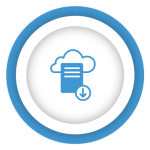Actions that require a licence
Emailing
Emailing copies of articles or extracts from publications.
Saving
Saving copies of articles or extracts on a local PC, central server or company intranet.
Sharing
Providing multiple access or sharing media clippings online.
Uploading
Uploading and republishing of articles on your website.
Photocopying
Photocopying or scanning from books, journals or magazines.
Printing
Copying or printing from electronic or online content.
Act responsibly. Protect your organisation. Support creatives.
Copy, Right.
The CLA licence provides an annual blanket cover so you don’t have to seek permissions from copyright owners each time you copy. This protects your business from potential copyright infringement whilst supporting the creative ecosystem to ensure quality content continues.
CLA licence features
Do you receive press clippings?
If your organisation receives media clippings from a PR agency or a Media Monitoring Organisation, you require a CLA Business Licence to share these clippings internally.
This includes saving them to a shared drive, email, printing, copying or even forwarding these clippings throughout your organisation. Without the appropriate copyright licence, you are at risk of copyright infringement.
Are you a PR firm?
The Media Consultancy Licence is offered exclusively to PR and communications firms as an add-on to the Business Licence. Where the CLA Business Licence permits the copying and reuse of material only for internal purposes; the Media Consultancy Licence allows articles and news items to be copied and shared externally.
This licence provides comprehensive copyright clearance and the peace of mind that comes with it.
Hold a NLA Licence?
CLA and NLA are separate licensing bodies. If your organisation holds an NLA licence, it’s likely you require a CLA licence in addition to avoid copyright infringement. There is no crossover in the publications covered by each licence.
Compare licencesWebsite republishing
If your organisation republishes content on a website, you require a copyright licence to avoid copyright infringement. Discover more about website republishing and what is permitted with a copyright licence from CLA.
Discover moreWhat can and can't be copied
| Permitted | Not permitted |
|---|---|
| Books | Workbooks, workcards, assignment sheets, test/assessment papers |
| Journals | Maps and charts |
| Magazines | Newspapers* |
| Digital version or ebooks | Printed music |
| Some websites | A work which has been expressly excluded by the rightsholder |
*Newspapers may be copied under NLA Media Access Licence
A licence tailored to you
Our range of copyright licences have been specifically developed to cover the individual requirements of organisations. By ensuring your business is protected, you unlock supporting digital tools to help you get the most out of your copyright licence.
The cost of our copyright licence is based on the type and size of your organisation.
Business
Our Business Licence provides a simple solution for copyright compliance, enabling you to research, collaborate, and create with peace of mind.
Discover how you can legally reuse content from millions of digital and print publications ranging from trade magazines to scientific journals and news websites, including articles from media monitoring services.
Education
Our range of licences and services supports teaching and learning across the UK education sector, including state-funded and independent schools, further education colleges, universities, and commercial language schools.
Learn how your institution can access and share content lawfully to educate the creators of tomorrow.
Public Sector
Our licences and solutions provide essential support and peace of mind to the public sector, whether you are an NHS staff member, a local government worker, or a decision-maker in central government.
Discover how you can easily and legally access, reuse, and share content from millions of scientific, technical, and medical publications.







